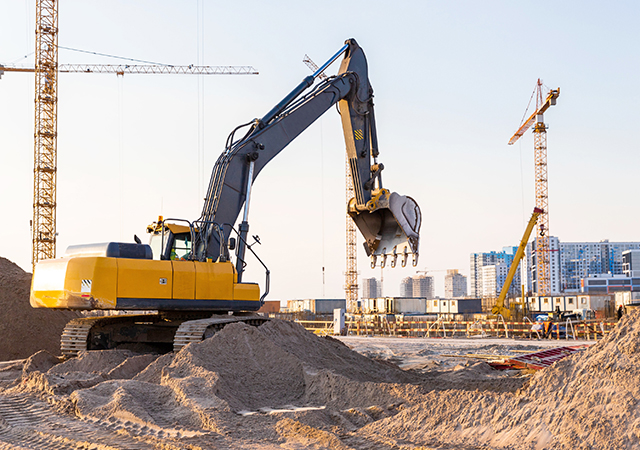Building sustainable foundations for future
The construction industry is a major polluter, but sustainable procurement can help. By considering environmental and social factors throughout the supply chain, companies can reduce their impact and become more competitive, says SAM ACHAMPONG* of the Chartered Institute of Procurement & Supply (CIPS).
01 July 2024
At a time when the way businesses operate is being scrutinised more than ever, it is crucial that construction companies look at how they can build solid foundations to develop sustainable and ethical frameworks from which to operate.
Currently, 40 per cent of global carbon emissions are generated by the built environment, which is indirectly responsible for 25 per cent of all greenhouse-gas emissions. Hence, chief procurement officers (CPOs) will play a key role in helping companies decarbonise and improve profitability. Construction procurement teams are entering a new era, and need to rehaul policies to ensure that their carbon footprint can be reduced.
So, what is sustainable procurement and why is it important for businesses to transition to more sustainable operations?
Sustainable procurement supports the green goals of an organisation and optimises the environmental, social, and economic impacts over the life cycle of the product or service. Some typical sustainable procurement practices include compliance with environmental laws and targets, the removal of hazardous/forbidden materials and waste in the supply chain, as well as thorough vetting of suppliers for fair labour practices.
 |
|
Achampong |
For the construction industry, sustainable procurement encourages the use of materials and equipment that have minimal environmental impact, and ways to reduce carbon emissions, water usage and waste generation should be explored. Procurement plays a crucial role in construction, typically accounting for 40 to 70 per cent of a company’s total spending, and industry executives see the function as a trusted business partner. Sourcing recycled and renewable materials helps to conserve natural resources, mitigates the depletion of finite resources and promotes responsible consumption. This is key in the construction industry’s efforts to reduce the negative impact it has on the environment.
According to the American multinational strategy and management consulting firm McKinsey & Company, despite the significant impact of procurement, the construction industry is not keeping up with other industries when it comes to implementing best practices. This is partially explained by external challenges – such as limited control over project specifications and complex, fragmented supply chains – and internal challenges such as decentralised project-by-project mindsets. But it is clear that construction CPOs need to take the lead and implement sustainable policies that are future proof, not only for environmental and social reasons, but for the many benefits it can offer businesses.
Contrary to traditional thinking that sustainable practices are costly, in fact they generate long-term cost savings. Even though there may be higher upfront costs, increased energy efficiency, reduced maintenance requirements and lower lifecycle costs mean longer-term savings. Taking into consideration the total cost of ownership rather than purchase price, it’s evident there are long-term benefits for the construction industry.
Sustainable procurement should give organisations a competitive advantage and help to ‘future proof’ themselves against scarcity in supply and changes in social, economic, and environmental factors.
 |
|
Digital technology in construction provides opportunities for sustainable procurement, enhancing safety and efficiency. |
Social issues in the supply chain, such as slavery, forced labour and human trafficking, affects every industry, whether it is electronics, steel, agriculture, textiles, construction or oil and gas. Governments and consumers are supporting, if not demanding, that organisations act to implement ethical and sustainable practices. If processes in the supply chain are not sustainable, it can have a serious detrimental effect, causing reputational damage if companies are found to be sourcing from suppliers who use exploitive labour, forbidden materials, or poor waste disposal practices and businesses can face legal action if they do not meet the minimum legal requirements.
In order to avoid this, businesses should be developing, and adhering to, an ethical strategy or code of conduct. Being able to demonstrate that you have policies in place to keep your business and your supply chain free from fraud, corruption and modern-day slavery, is vital for CEOs and CPOs today.
An ethical code of conduct should cover a range of issues. For procurement professionals, all suppliers should be treated fairly at all stages of the procurement process. Procurement professionals should discourage the unfair use of buying power or influence and must not tolerate corruption in any form. Organisations face critical decisions about how to integrate their current strategy to become more ethical. Implementing a strategy, particularly one with a change of process and policy, can cause resistance within an organisation.
Companies have a huge role to play in minimising risk of social exploitation within the supply chain, so ensuring the strategy is applied properly is key, which is why it is important to establish consistent behaviour across the organisation. This creates an atmosphere that will actively support the reporting of unethical behaviour. There are some measures that companies can implement to keep their procurement ethical:
• Ethics policy: Every organisation should have an ethical policy, making clear what the organisation sees as ethical and unethical. This ensures there is no dispute.
• Ethics training: Training employees to be aware of ethical practices is important. It helps employees understand what could interfere in their day-to-day jobs, as well as being tested to show what they have understood.
• Audits: Frequent audits can help deter unethical behaviour.
• Zero tolerance: Any breaches of basic standards such as corruption, fraud, bribery, and modern slavery should be addressed immediately. Take the time to investigate the issue to prevent it from occurring again in the supply chain. These breaches are illegal and cause enormous reputational damage.
• Benchmarking: Introduce a benchmarking measure which outlines ethical performance against competitors. This gives an incentive to improve ethical behaviours.
• Reward good ethical practice: Reward suppliers when they are implementing good ethical practice. Companies can give them a ‘preferred supplier’ status or similar status which will direct orders towards better-performing suppliers.
Procurement teams in the construction sector have come under more pressure during and post the Covid-19 crisis, to manage labour shortages, make sites safe and mitigate disrupted supply chains. CIPS has recognised this and in order that it gives construction-specific, world-class procurement support, it has established the CIPS Construction Leaders Group. Made up of senior leaders from major firms, they work with the institute’s experts to drive excellence in construction procurement and supply.
Aside from business expectations, it is our own individual social responsibility to act ethically. Sustainable procurement considers the social impact of construction materials and services and encourages the fair treatment of all, safe working conditions and adherence to labour laws.
If construction companies can embrace both social and environmental aspects of sustainable procurement and put in place solid strategies and policies to support growth, then there is huge potential for the industry to enter a new era of sustainable construction that promotes long-term economic viability while also embracing social and environmental accountability.
* Sam Achampong is Regional Director MENA at CIPS (Chartered Institute of Procurement & Supply), a global professional body working for the procurement and supply profession.
- Building sustainable foundations for future
- Who leads in greener construction?
- Hoffmann Green breaks ground on Saudi plant



